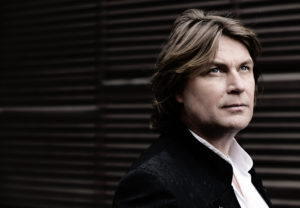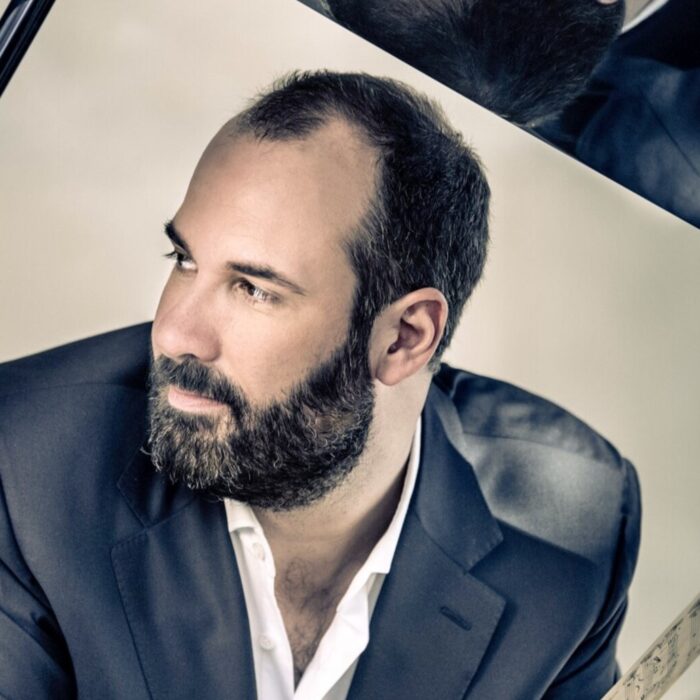
The Lyrical Heldentenor – Klaus Florian Vogt On A Different Wagnerian Approach & ‘Fidelio’s’ Rigidity
By Francisco SalazarThe Wagner tenor is a rare breed, often defined by a thick and granular quality that can easily cut through the orchestra, all while singing the most difficult music in the operatic canon.
When we think of Wagnerian voices, we think dark and heavy, not light and delicate.
Unless of course, we are talking about Klaus Florian Vogt. Arguably the tenor most associated with the Wagnerian repertoire today, Vogt is far from the prototypical heldentenor. His voice, sweet and lyrical in its timbre, is more likely to conjure up the bel canto repertoire than Wagner on first listen. And yet, Vogt has been dominating the repertoire for years.
“I think these so-called heldentenor parts are actually big lyric parts. And so it’s also nice if you have this lyric and piano voice,” Vogt told Operawire during an exclusive interview at the Met Opera press lounge.
The Wagner Sound
So how does one come to dominate Wagner’s repertoire with such a delicate-sounding voice? The answer comes down to the French horn.
Vogt was once a professional horn player who was steadily working his way into a stable orchestral gig.
“My voice was discovered. I didn’t decide for myself,” he confessed. “I was kind of decided so it was a funny story. And totally random.”
His wife was training to be a singer and suggested that the two put together a little duet for a family gathering. There was no intention on Vogt’s part to make more of the event, but his mother-in-law, a singer with the Bayreuth Festival Choir, heard a recording of the performance and suggested that Vogt train his voice. The rest, as they say, is history.
Unlike what one might expect, Vogt found the transition from the world of the orchestra pit to the stage rather smooth. Not only had Vogt previously played some of the operas he would go on to sing, but he knew where the most exposed and heaviest parts of the operas were.
“That [training as a horn player] helped me because I learned very early on to work with my breath. So it was not a new thing to use the body to make sound. It also helped me a lot because I know how loud and how heavy this can be in an orchestra. So it doesn’t scare me when it’s really heavy.”
When he began singing on stage he discovered something else, acting. Wagnerians, admired for their voices and placing special emphasis on keeping their singing healthy for hour-long performances, often sacrifice this essential element in their presentations. But Vogt discovered that acting was actually an important part and crucial to his work onstage.
“For me, the acting helps the singing. And also the singing helps with the acting. That was really new for me when I came from the pit,” he stated. “But now I love to act. I think you act well when you are this different person on stage. To be another character is a kind of funny thing but it’s really interesting and it’s always a challenge and I love it.”
When it came time to actually take on the behemoth that is the Wagner repertoire, Vogt found that having a solid technique and acting is not enough to be truly successful.
“I don’t think Wagner wanted to have this massive sound. If you look at the score he writes very often piano or pianissimo. And he writes big lines for the orchestra but also for the singers. I think these so-called heldentenor parts are big lyric parts. And so it’s also nice if you have this lyric and piano voice. If you have a conductor who cares about the dynamics, it can work.”
Of course, the tenor knows that not all conductors will stray from their interpretations to accommodate a light approach. But even if he finds himself in this situation, facing down a thicker musical interpretation, he should never feel like he has to compete.
“I try never to get over the orchestra but through the orchestra. And so it works. I also feel like a team player together with the orchestra,” he added. “If you begin to fight the orchestra, in anything, you will be lost. If you force and you try to fight against this big sound, it’s dangerous.”
This approach has reaped tremendous benefits for the tenor, who has made a name for himself in such roles as “Lohengrin,” Siegmund in “Die Walkure,” Walther in “Der Meistersinger” and Erik in “Die Fliegende Hollander.”
Expanding the Wagner Universe
Acclaim can sometimes lead to the pressure of adding more roles and easily burning out. That would be the understatement of the century when it comes to the Wagner tenor, a truly rare breed. However, Vogt, despite being the Wagner heldentenor du jour, has been very careful when adding roles. For him it is important to learn a role well enough, sing it for a good amount of time and wait for the voice to give a confident and emphatic “Yes!”
And by his own admission, he feels ready to tackle the title role in “Tannhäuser,” one of the most demanding operas in the repertoire.
“It’s a step into more and bigger kind of stuff. But it’s fun to study it,” Vogt revealed. “I am happy I waited for it and I am doing it just now and not five years ago. It’s a little bit different to Lohengrin. You have these ensembles that are very fast and it’s more like classical music.”
While it is definitely a heavier role and a lot more challenging, the role presents many of the same types of singing that he is used to.
“You have to use your technique and the main thing is that you are heard. I feel that somethings are like ‘Parsifal’ and some things are like ‘Lohengrin.’ There are elements you can discover in every piece. What you can use and what I know from before. Because I did a lot of ‘Lohengrin.’ I can use this for ‘Parsifal’ and I can use it for ‘Tannhäuser.'”
So what comes after “Tannhäuser?”
“After ‘Tannhäuser,’ there is ‘Tristan [und Isolde]’ and the Siegfrieds. My plan is to wait with it again some years. Now there is ‘Tannhäuser’ and I will get familiar with it. And then try to develop the other operas for me and then we will see if it comes.”
Beethoven’ s “Fidelio”
His captivating Wagnerian turns have thrilled European audiences for years so it is an interesting turn of events that for his return to the Metropolitan Opera, after an 11-year absence, he is taking on the role of Florestan in Beethoven’s “Fidelio.”
When recalling his debut at the Met 11 years ago in “Lohengrin,” Vogt quickly remarked on the change he has felt in that time span.
“My voice has got more dark colors and also the condition of it is more settled than 11 years ago. I, as a person, have developed. It’s very nice. I’m feeling honored and it’s a big story for me to come back to New York to sing at the Met. It’s always a great story.”
The bonuses are also working with some dear colleagues, which include Adrianne Pieczonka, David Portillo, and Greer Grimsley.
“It’s a big pleasure to work with a cast like that. Most of them I knew before except for the Jacquino [David Portillo],” he explained. “With all of them, I sang before. So it’s nice and we have a lot of fun during the rehearsal.”
The tenor has performed Beethoven’s “Fidelio” over the years in Milan, Vienna, and Munich, garnering rave reviews for his work. Although it is not a role that he would call one of his war horses, he is very attuned to the style that Beethoven requires.
“Beethoven is totally classic stuff and I think you have to sing it like that,” he said. “So you have to be exactly in time. You can’t really do big ritardandos or something that doesn’t fit a piece like that. It does not fit to Beethoven. With Wagner, you have more space to play with your voice or play with a figure that you have to present. Beethoven’s a little more chained and fixed.”
This stylistic shift would present challenges for most singers, but Vogt credits his leader in the pit for making the process as smooth as possible.
“With [conductor] Sebastian Weigle, we have a musician in the pit who wants to have it really classical. Not mixed with romantic things. So it’s really straight kind of singing. Some call it instrumental,” Vogt emphasized.
He is also lucky to be working with the original director of the production, Jürgen Flimm. While Vogt has a strong opinion about the character, Flimm is getting him to see Florestan in a very different light.
“Jürgen wants Florestan really weak and really tired of this time in prison. So you have to always deal with the fact that the part is strong to sing but you have to play weak. That is a really big challenge.
“Florestan is also really nice to be because he is in prison innocently. So what does this do to a person if he is innocent and in jail? How does he deal with Rocco and what does he think when his big love Leonore comes to free him? These are big questions and challenges.”
What other challenges does the role present for Vogt?
“I think the first time that I did this role it was a big challenge because of this aria, “Gott! Welch’ Dunkel hier!” It’s difficult and totally open and you are totally alone on stage. But I fell in love with this part. So the development of my voice has also helped.”
One of the most fascinating moments of Florestan’s music is his very first note, a striking crescendo on a single note that comes out of nowhere. It comes halfway through the show and is a veritable nightmare for most tenors tackling the role. Vogt sees that note differently. “The very first note is my favorite. But also the very end. It’s very nice with all the chorus and getting freed. So that is a great moment.”
Returning to the Met
For those are who asking when Vogt will be bringing his Wagnerian expertise to the Met, don’t fret because the Metropolitan Opera already has him scheduled for the 2017-18 season to bring his acclaimed “Parsifal” to Francois Girard’s production.
The tenor is particularly excited for the opera because it presents a great acting and vocal challenge.
“Parsifal is a very special part because he makes, during the evening, a really big development. He totally changes in his person,” Vogt elaborated. “He comes in as a naive. He doesn’t know anything about anything and so he comes in this world and has to look at things he never thought about and this gets him into trouble during the whole piece. At the very end, he is the one who is kind of chief boss and messiah.
“The interesting thing about this person is that you have to do it by acting but you also have to do it with your voice, with pure voice at the beginning and much more heroic voice at the end.”
While the “Parsifal” is already set in stone, Vogt’s Met Opera future remains cloudy at best.
“I would love to come to the Met much more and hopefully not wait 11 years again.”


